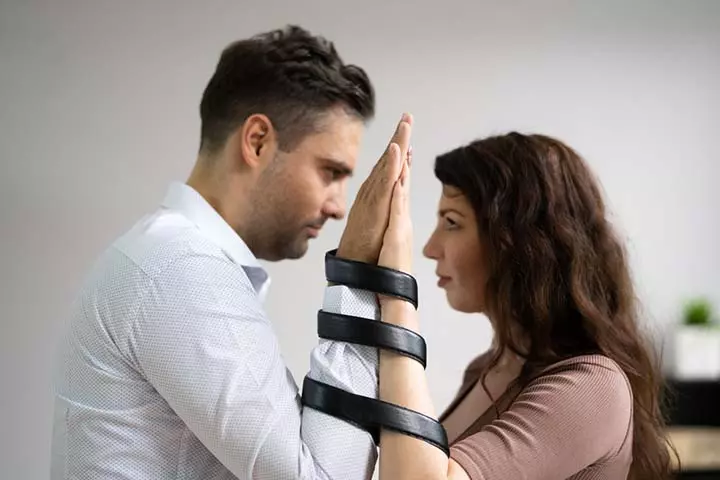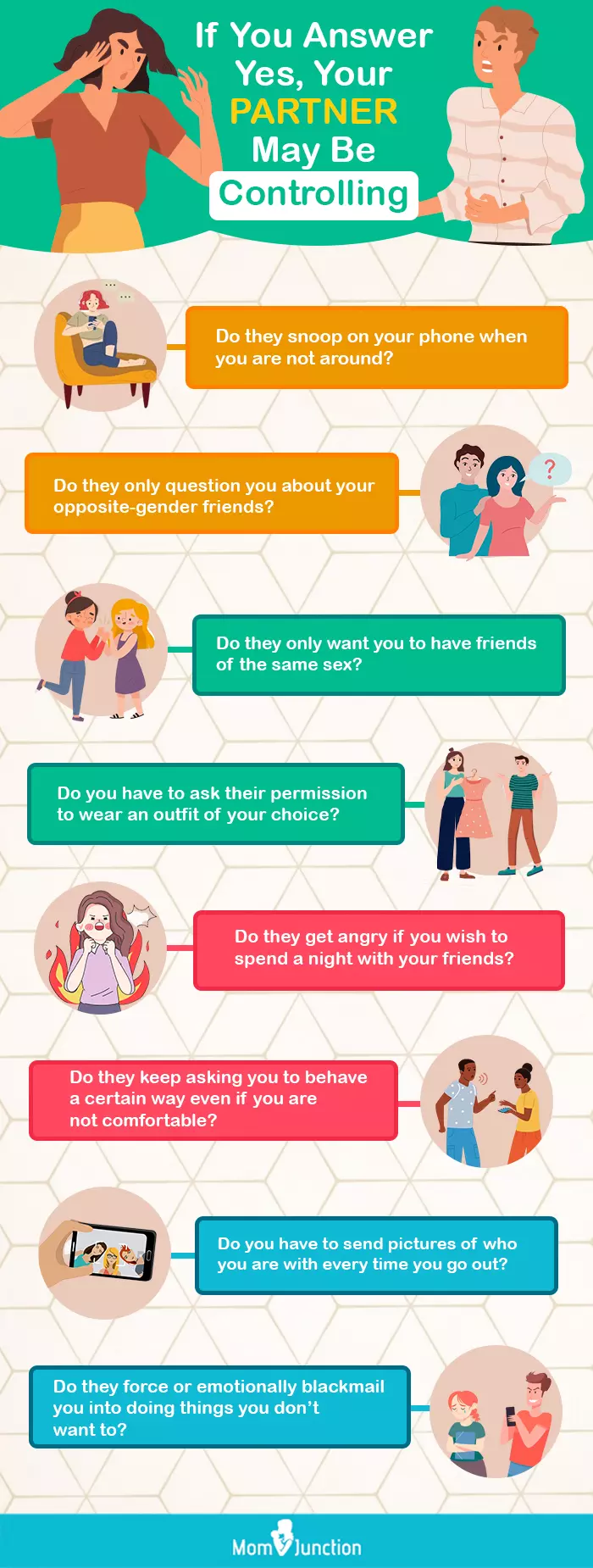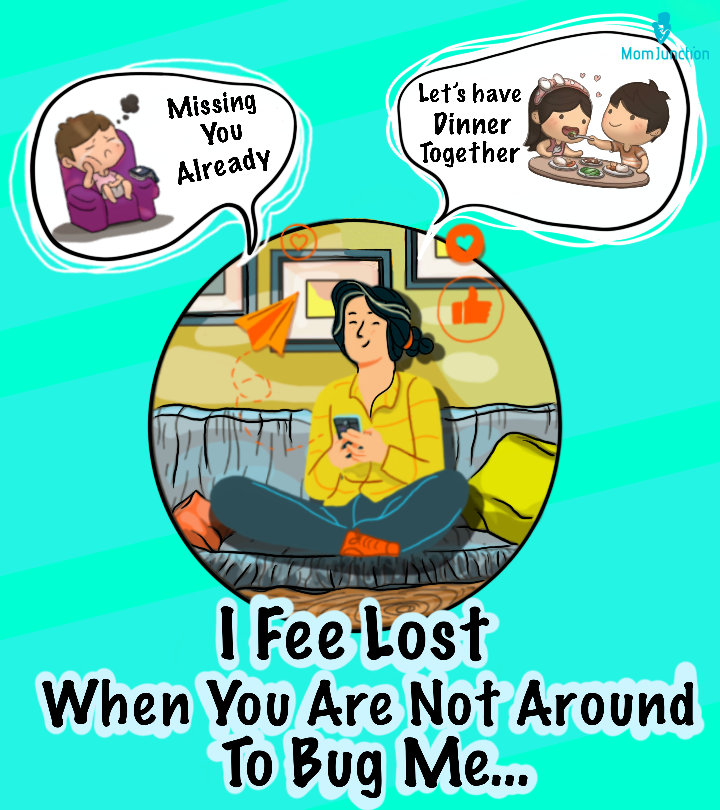
Image: Shutterstock
Having a caring and protective partner who makes sure you’re safe and your needs are fulfilled is a blessing. But, being in a controlling relationship is a traumatic experience. Your partner is least concerned about your freedom and space, and you feel like a bird in a cage. Although having someone supportive overseeing your work may sometimes be helpful, if this becomes constraining or enslaving, it may be time to leave. Hence, when this attention may give way to controlling behavior, and you feel suffocated in the relationship. A toxic relationship makes your life miserable, and you feel like losing your individuality. If you have a control-freak partner, and you are suffering in a toxic relationship, it is high time you confront your partner and speak out about your ordeal. If they continue with their behavior, you should prioritize your mental well-being and part ways with them. Here we discuss what a controlling relationship is, its signs, and how to deal with it.

Key Pointers
- In a controlling relationship, only one partner makes all decisions for both the parties involved.
- Emotional isolation, destructive criticism, codependency, threats, and abuse are a few of the other behaviors and signs of a controlling person.
- You should put an end to such a relationship if you begin to develop mistrust for all, being in the relationship feels life-threatening, you stop loving yourself, etc.
What Is A Controlling Relationship?
A controlling relationship is one in which usually one partner is making the decisions, handling the steering wheel of the other’s life, calling the shots, and basically, holding the strings to control their partner. In such relationships, the other partner will have no option but to abide by the rules set by the controlling partner.
It usually begins with a “you are not taking me seriously” or “you are not allowed to do this… or that.” You begin to accept this behavior: either because you think it is normal for someone who loves you to control you, or because you think they are doing it all for your own good.
According to life coach Rodolfo Parlati, “Protective behavior stems from a genuine place of care and respect. It’s all about supporting your well-being while also honoring your autonomy and choices. On the flip side, controlling behavior tends to involve manipulation, limiting your independence, and is often fueled by insecurity or a desire for dominance. A protective partner will openly discuss their concerns and truly value your input, whereas a controlling partner might brush off your perspective or try to guilt you into going along with their wishes. Trust your gut—if you’re feeling restricted, anxious, or like you’re being watched, it might be time to take a closer look at the dynamics in your relationship.”
 Did you know?
Did you know?Signs Of A Controlling Relationship
The controlling partner will cross all the boundaries to get things done their way; sometimes they may not even know that their behavior is hurting their partner, and will be under the illusion that whatever they are doing is the best for their partner.
To prevent things from going out of your control, watch out for these signs of manipulation in the relationship.
- Emotional isolation
The controlling partner tries to break you so that you have no other option but to surrender to them. They try subduing your emotions and relationships with friends and family (1). It is like they’re weaving a spider web around you to make sure you have no additional support in life.
A controlling partner is always:
- Nagging you not to spend time with your friends
- Demeaning your best friend
- Filling your brain with negativity about your loved ones and friends
- Trying to turn you against anyone, other than them, that you look up to or rely upon.
- Destructive criticism
In a healthy relationship, both the partners seek feedback from each other, which should ideally help them become better individuals. For instance, if you are having trouble with your boss, an ideal partner will sit with you, listen to your problems, and try to ease your pain, whereas a controlling partner would try directing the blame on you and say, “I am sure it is your fault” or “you must’ve done something for your boss to say or do that.” They will look for something wrong in everything you do and say.
They almost always wish that you eat, dress, walk, and even talk better. If you protest, they will say, “I love you and want you to be a better person. That’s why I want you to be this way or do what I say.” You will often feel like you are being punished for no apparent reason and they may also give you the silent treatment, making you wonder what “mistake” you possibly could have made. You will feel like you’re walking on eggshells around them and frequently apologize, even though you’ve done nothing wrong, just to keep the peace (2).
- Codependency
If you do not break this controlling behavior in the initial stages, you will lose your power to think and become increasingly dependent on your partner. Even a simple decision, like deciding on the dinner menu, will be difficult without asking your partner first. Saddled with responsibilities and work, slowly, you will lose your self-sufficiency, which makes you depressed. They will not respect your boundaries and always try to get their own way, and if that doesn’t work, they’ll blame you for ruining their life (2).
 Point to consider
Point to consider
- Threats and abuse
The controlling partner will go to any lengths to have the reins in their hand. They will resort to emotional and physical threats such as “if you leave me and go now, you will never see me again,” “you must do as I say or else….” You will be stuck in the relationship out of fear that your partner will harm you or themselves. Other times, the threats will be about curbing financial support, cutting off access to children and pets, and even self-harm (3). Whether or not these risks are real, statements like these are a sign that your partner wants to get their way, even if it is hurting you.
If not noticed early enough, these threats may take a darker turn and manifest as intimate partner violence (IPV). A study published in the BMC Public Health Journal concluded that controlling behavior from a partner is closely associated with physical and sexual violence (4).
- Conditional love
One more sign of a controlling relationship is conditioning their love and affection. For example, if you find your partner say, “I will love you if you do or be this for me,” or “I would have fulfilled all your dreams if you behaved yourself.” If these are the statements you hear often, your partner does not love you for who you are. They only love you if they can pull strings and get things done through you.
- The guilt card
Controlling partners are master manipulators and will trick you into believing that they are controlling you for your own good, and showing any resistance is utter disrespect. They will get into your head and make you believe that things between the two of you are quite normal. They even give you statistics or examples that the majority of the partners behave like them. They will make you feel guilty for fighting with them and not being able to earn their love.
Prudence Leung, registered psychotherapist says, “Protective behaviors will always have your best interests in mind. However, controlling behaviors are quite the opposite. This includes making decisions on your behalf without you having any opinion on this decision; directly or indirectly discouraging your independence; and using manipulation, guilt, shame, anger, or other tactics to get you to behave in a way that serves their best interest, not yours.”
They will also coerce you into rushing into the relationship, from cohabitation to marriage and kids, like a whirlwind romance (2). Then, if you have qualms about moving too fast, they’ll make you feel guilty for “not loving them as much as they love you.”
- No privacy
You will have no privacy if you are in a controlling relationship. A controlling partner expects total access to your mobile, bank account, and email accounts while restricting access to theirs. They will try to manage your daily activities. They may also try to curb your freedom, leading to a loss of autonomy. It has been found that “partner behavior control, as an external factor, restricts the controlled partner’s freedom to act according to their own will, thus hindering their ability to satisfy their need for autonomy (5).” They may also constantly call and text you no matter how busy you are, all under the guise of being protective.
Blogger Kiersten Hathcock recalls her experience in a controlling relationship on her blog. She writes, “During the honeymoon stage of a new relationship, you expect to stay up all night talking about your deepest thoughts and feelings… What I didn’t expect was to be tied to my phone every minute of the day when I wasn’t with him. He constantly sent me texts asking how and where I was in the moment. If I didn’t write back right away—because God forbid I was in a meeting or simply living life—he’d frantically text bomb me. Where are you? Are you okay? Please text me… I’m worried. Rarely could I have a drink with a friend or spend vacation time with girlfriends or family without fielding a barrage of texts and phone calls…I spent 90 percent of my time making sure I responded to him and it felt oddly normal because it ramped up so gradually. It was only when I was finally out of the relationship that I saw the constant texting and calling as controlling rather than loving and protective (ii).”
 Do remember
Do remember- Jealousy
You might have been flattered when your partner wanted to have all of you to themselves. While it may seem wildly romantic at first, you’d gradually realize the real meaning of that. A controlling partner will view your every interaction with a stranger as flirting, and be threatened by that. They get jealous and will keep tabs on your whereabouts and suspect your every move. The controlling partner might even fall to the level of embarrassing you in public to lower your self-esteem.
Eszter Brhlik, an author, recalls how she realized later on that she was in an abusive relationship and her partner tried to control her every thought and move. She says, “I remember when we visited his family, he pointed out that I always go to sleep at 10 pm, and I’m like a little child. I also remember he told in front of people that I was stupid and useless. He made fun of my shortcomings in public whenever he could (i).”
- Score-keeping
You are angry with your partner for not informing you about their plans of spending the night out. When you confront them about it, they remind you of when you failed to inform them about being late from work three months ago. A controlling partner ensures they get even with you in every way possible. They remember all your past mistakes and use it to their advantage. They point out your mistakes to divert your attention from their mistakes and to keep you in check. Even if you apologize, they will still hang on to it and try to make you feel guilty.
- Financial control
Your partner may make you financially dependent, placing you on a strict budget, limiting access to your bank account, keeping you from financial resources like credit cards, and rigorously monitoring your spending. This form of coercive control restricts your freedom and ability to leave the relationship (1). They may also stop you from working or sabotage your job to keep you disempowered (6). Then, when you wish to regain control of your finances, they guilt-trip you and make you feel like you cannot be trusted with money.
You might have fallen in love with your partner, and may think that you cannot live without them. But if they are using your love for them as a weakness to manipulate you, then it is time to take a step back and evaluate if you want to be with this person or not.
How Does A Controlling Relationship Affect You?
Emotional abuse, as exhibited in a controlling relationship, can have numerous devastating short-term and long-term effects on your mental and physical health and overall well-being. Here are some effects you should watch out for and address as soon as possible (3).
- Feelings of guilt, shame, fear, confusion, and powerlessness.
- Doubting one’s abilities and feeling worthless.
- Depression and anxiety.
- Loss of sense of oneself and overall hopelessness.
- Physical symptoms like chronic pains and muscle tension.
- Frequent crying, moodiness, and difficulty concentrating.
Valeriya Bauer, registered associate marriage and family therapist & professional clinical counselor says, “Another aspect to keep in mind is that our bodies (and the somatic response) are incredibly strong. Pay attention to how your body feels about the partner’s behavior – does your body feel uncomfortable, and scared, or does it feel safe? Do you have an inner gut feeling that something is off? Trust that feeling.”
When Should You Put An End To Your Controlling Relationship?

Most controlling and manipulative relationships turn into physically or verbally abusive ones sooner or later. It is not at all selfish to have second thoughts on such a relationship. It may seem difficult to get out of it, but you may have to walk away and take control of your life when:
- Your partner has turned abusive, and you feel that your relationship has become life-threatening.
- They have absolutely no trust in you and always accuse you of having an affair with anyone and everyone you talk to.
- You stop loving yourself and start believing all the bad things your partner says about you.
- Your partner refuses to believe that they need help and does not cooperate with you.
- You see that there is no future for you in your relationship because all your partner thinks is about themselves and their presence is overpowering your dreams and ambitions.
- Your partner does not even think for a second before throwing you under the bus or crushing you with blames when things go wrong.
- You feel emotionally drained and are failing at all the other aspects of your life, and find balancing your career and relationships very difficult.
- You find that your partner is secretive, disrespectful, and takes decisions knowing they will adversely affect you.
- Your partner does not seem to look at or consider your perspective.
If you can relate to most or all of these points, then gather all your self-esteem, evaluate what is best for you, and take steps towards it. These points will help you in determining what you really need to do. You have only one life, and it is not worth sacrificing it for a person who uses you for their needs but doesn’t care about your well being.
What Should You Do If Your Partner Is Controlling?
Before putting an end to a controlling relationship, you can try and discuss your problems with your partner and let them know that their behavior is hurting you. Here are a few ways to do that and resist being controlled in a relationship (7).
- Never give up on yourself, and always make self-care a priority; every degrading word uttered by your controlling partner is only to break your confidence and gain control over you. Don’t let them win at their work of limiting you.

- Stop crossing mountains for a person who cannot even cross a puddle for you. If your partner is making his love conditional, do not beg or do things to please them.
- Stop pretending like everything’s okay, and stop blaming yourself for your partner’s actions. You don’t deserve to be shamed and insulted; remember that it is not normal and not your fault.
- Write down or journal your reality because one of the biggest tactics a controlling partner uses to make you doubt your version of the events. By keeping a record of your life, you can look back on it to confirm your memories.
- Think about what you are good at and do more of that. Whether it is something in your profession or a hobby, pursue it. When you are good at something, you will become more confident and feel good about yourself. This will help you get out of the vicious circle of wanting your dictating partner’s validation.
- Stop making excuses for your partner’s abusive behavior. They have no right to shout at you or hit you just because you did not do what they want. Question what you consider “normal.” You may think controlling and abusive behavior is the norm if you’ve grown up in an emotionally volatile home, but what you are used to may not necessarily be healthy.
Is walking out of the relationship the only solution? Not always. If your controlling boyfriend or girlfriend can understand that you feel trapped and is willing to change for you, then with some help, both of you can set some ground rules and start a new life together. But that may not always be the case.
How To End A Controlling Relationship?
Unfortunately, if your partner is not ready to listen to you and change their ways, then it is time to do what is in your best interests. Do not be under the impression that you cannot live without them. Even though it might hurt you a little now and might feel overwhelming, things will get better eventually. Here are a few points to keep in mind before deciding to walk out.
- Before thinking of ending the relationship, be sure that you are actually in a controlling relationship and that you have tried everything possible to repair it.
- Introspect to know if this is what you want wholeheartedly because taking decisions based on emotions can make you regret.
- After you have made the decision, do not expect your partner to change, and do not fall for the mixed and compelling signals they give you. Controlling partners can be manipulative and might try to reel you in by influencing you.
- Do not react to any retaliation from your partner, as this may lead to humiliation and can leave you emotionally scarred.
- End all contacts with them, and block them on social media and mobile. But first, initiate the process of separation, legally if you are married, and seek help from friends and family if needed. If necessary, have an available phone number of domestic violence assistance.

- Focus on the positives in your life, work to rebuild yourself, shift your focus on to work and career, and accept the past, but never let it define your future.
Usually, resistance to control is not taken well by the controlling partner. Resist too much, and it could put you in harm’s way, especially if the partner has violent tendencies. But wait. What if you are the controlling partner?
How Not To Be Controlling In A Relationship
Have you realized that you are the controlling partner in the relationship? Well, congratulations then! You are already halfway through to change for the better. For the rest of the way, here are a few tips on how you can stop controlling and save your relationship.
- Do not order, but suggest: The next time you want your partner to do something your way, do not be ordering around. Instead, make them sit and explain the pros and cons. Your partner is an adult and can think rationally. So have trust and let go. You will be surprised to see your partner go along with your plan, not out of fear, but because they were able to understand the advantages of it.
- Exchange pleasantries: Ego and love can never coexist, so it is up to you to decide which way you choose. Understand and accept that a relationship means two people who are equal, and there is nothing wrong in saying “thank you,” “please” and “I love you”. Simple pleasantries and niceness will make your partner happy. But remember you must not use these to manipulate or get things done by them. This means you must return favors too.
- Practice listening: A relationship is a union of two people, which means both must have a say in what goes in the relationship. Having a know-it-all attitude is terrible for your relationship; your partner might have a better solution to a problem, which you will never know about if you do not listen.

- Sometimes you, sometimes me: Next time, when you are planning a vacation, ask your partner their ideas. And when they tell you, value their opinion or planning and execute it. This will help them gain their self-confidence back and make them happy. This give-and-take action must be selfless and not to keep scores to decide who gets to do what next.
- Know your anxiety: Know the real reason behind your controlling behavior. Is it the fear of failure or the obsessive compulsion that is making you behave that way? Accept the fact that you cannot always control everything in life, and it is okay for things to go wrong. It is better to lose control than to lose a loving partner due to your imaginary fears.
- Accept them as they are: No one is perfect. Neither you nor your partner. If your partner is willing to accept your flaws, then why can’t you? Expecting your partner to be the best in everything is unfair. Accept them for who they are, focus on the positives, and pick your battles carefully.
- Check your expectations: It is okay to expect your partner to be loyal, loving, and caring, but depriving them of their privacy and personal space and hoping them to be happy with that is not. Also, do not compare your partner to your friends and family members and ask them to be like them. Because each person is unique, focus on what your partner’s uniqueness is bringing into your relationship.
Frequently Asked Questions
1. What causes a partner to be controlling?
The controlling and dominating behavior manifests in a partner due to several factors such as anxiety, personality disorders, learned behavior, past traumatic experiences, and low self-esteem.
2. How do I differentiate between a caring and controlling partner?
A caring partner may do things for you out of love and affection. Their presence and actions will positively affect your life and help you grow into a better person.
Whereas a controlling partner would pretend to care for you but their real motive could be to satisfy their ego. Being with a controlling partner will create misery and despair in your life.
3. Can controlling partners change?
To decide whether a controlling partner will change or not, you should understand the reason behind their behavior.
- If your partner controls you because of personality disorders, they may overcome this attitude if they get proper medical treatment
- If your partner’s modulating habits are because of past trauma, they may get over their habit by releasing their past emotions and accepting the new life
- However, if your partner exercises control because they love controlling people, they may seldom want to change
4. What to do if I recognize controlling behavior from my partner?
If your partner is showing controlling behavior but you are not ready to confront them or end the relationship yet, journal your experiences to have proof against gaslighting and manipulation. Talk and seek support from family or trusted friends, and if needed, explore counseling options from a professional to understand how to deal with the situation and maintain your well-being.
Living in a controlling relationship where they try piloting you, can be extremely difficult and often unsafe for you. Isolating you from friends and family, indulging in destructive criticism, and threatening and abusing you to do what they want are a few signs that your partner is trying to control you. If your partner manipulates and controls you, it’s time to think if you want to continue your relationship with them. Since controlling relationships can be toxic to mental health, ending such a relationship isn’t selfish.
Infographic: Questions To Ask Yourself To Check If Your Partner Is Controlling
When you are in love, it’s hard to believe that that person could be toxic to you, even though the signs may be quite apparent. This is why we have compiled a few questions for you to ask and answer yourself to help reveal your partner’s controlling behavior that you may have been overlooking. Illustration: Momjunction Design Team
Illustration: Signs of a Controlling Relationship

Image: Dall·E/MomJunction Design Team
Are you feeling like you’re not in control of your own life? Learn the must-know red flags of a controlling relationship in this video.
Personal Experience: Source
MomJunction articles include first-hand experiences to provide you with better insights through real-life narratives. Here are the sources of personal accounts referenced in this article.
i. I realized I was in an abusive relationship for years, after getting raped.https://medium.com/invisible-illness/i-realized-i-was-in-an-abusive-relationship-for-years-after-getting-raped-746b21ffe874
ii. I was in a controlling relationship, and I didn’t realize it.
https://www.kierstenhathcock.com/blog/i-was-in-a-controlling-relationship-and-i-didnt-realize-it
References
- What is coercive control?
https://www.relationshipsvictoria.org.au/news/what-is-coercive-control/ - 10 signs of a controlling relationship.
https://www.ncdv.org.uk/10-signs-of-a-controlling-relationship/ - Emotional and Psychological Abuse.
https://www.womenslaw.org/about-abuse/forms-abuse/emotional-and-psychological-abuse - Diddy Antai; (2011); Controlling behavior power relations within intimate relationships and intimate partner physical and sexual violence against women in Nigeria.
https://pmc.ncbi.nlm.nih.gov/articles/PMC3161889/ - Ruiming Lan et al.; (2025); The relationship between intimate partner behaviour control and impulsivity among college students: the chain mediating effect of autonomy needs satisfaction and intimacy quality.
https://www.nature.com/articles/s41599-024-02617-1 - Domestic Violence and Abuse.
https://www.helpguide.org/relationships/domestic-abuse/domestic-violence-and-abuse - How To Heal From Emotional Abuse.
https://health.clevelandclinic.org/how-to-heal-from-emotional-abuse
Community Experiences
Join the conversation and become a part of our nurturing community! Share your stories, experiences, and insights to connect with fellow parents.
Read full bio of Dr. Carlos Juan Carmona-Goyena
- Rodolfo Parlati is a professional life & executive coach and leadership trainer with over 17 years of expertise. After graduating in business administration and working in the related fields, Rodolfo got certified as a professional coach from Associazione Coaching Italia in 2020. He supports his clients in improving their communication skills, relationships, work-life balance, and productivity while reducing their stress.
 Rodolfo Parlati is a professional life & executive coach and leadership trainer with over 17 years of expertise. After graduating in business administration and working in the related fields, Rodolfo got certified as a professional coach from Associazione Coaching Italia in 2020. He supports his clients in improving their communication skills, relationships, work-life balance, and productivity while reducing their stress.
Rodolfo Parlati is a professional life & executive coach and leadership trainer with over 17 years of expertise. After graduating in business administration and working in the related fields, Rodolfo got certified as a professional coach from Associazione Coaching Italia in 2020. He supports his clients in improving their communication skills, relationships, work-life balance, and productivity while reducing their stress.
Read full bio of sanjana lagudu
Read full bio of Shikha Thakur
Read full bio of Benidamika J Latam

















